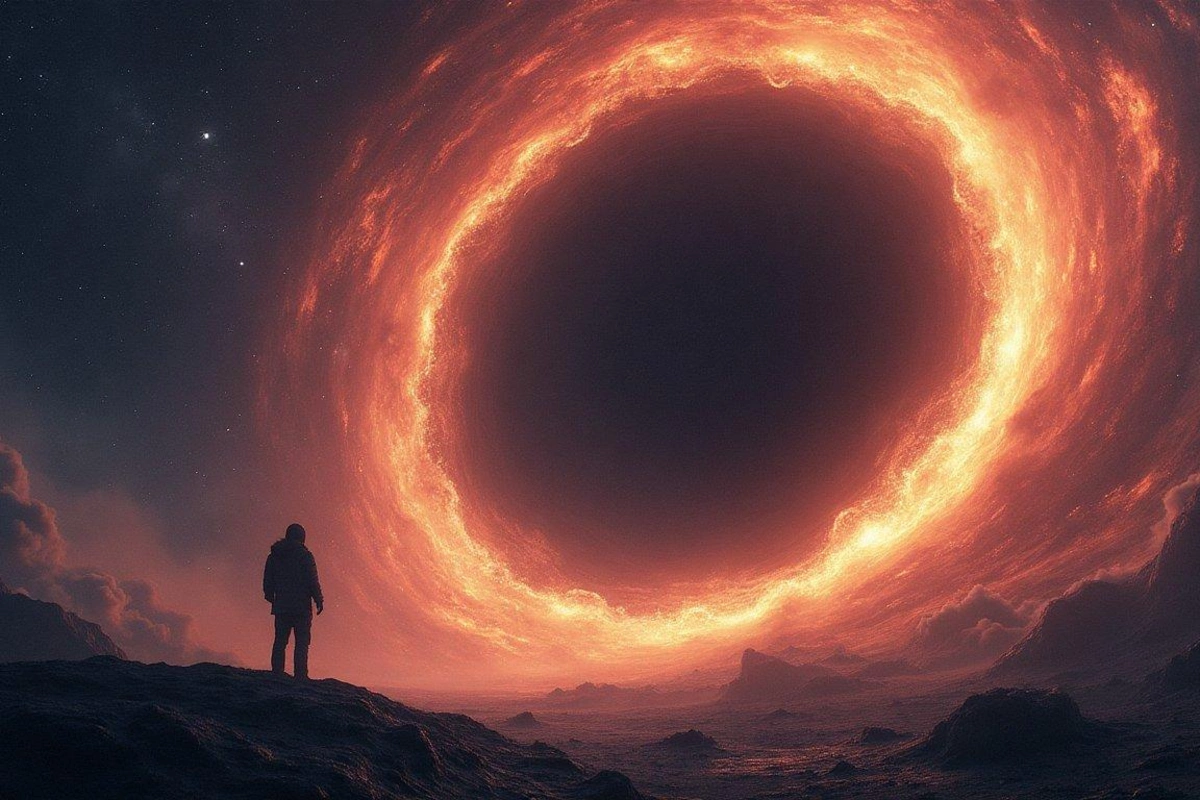What will happen to a person if they fall into a black hole?

Introduction: Black Hole - What Is It?
A black hole is a region of space-time where gravity is so strong that not even light can escape from it. It forms when a massive star exhausts its fuel and collapses under its own mass, or as a result of other cosmic processes, such as the merger of neutron stars. A black hole has an event horizon - an invisible boundary beyond which begins the point of no return. What happens inside remains one of the greatest mysteries of physics.
If a person decides to approach a black hole, they face a journey full of paradoxes and incredible physical phenomena. Let's consider what might happen at each stage.
Stage 1: Approaching the Event Horizon
Gravitational Effects and Spaghettification
As one approaches a black hole, they will begin to feel the effects of its powerful gravitational field. One of the most famous effects is the so-called spaghettification, caused by tidal forces. The gravity of the black hole is stronger at a person's feet (if they are falling feet first) than at their head, due to the difference in distance to the center of the black hole. This stretches the body lengthwise, like spaghetti, while simultaneously compressing it from the sides. For a stellar-mass black hole (about 10 solar masses), spaghettification would begin even before crossing the event horizon, and the person would, unfortunately, not survive due to the tearing of body tissues.
However, if the black hole is supermassive (millions or billions of solar masses, like those at the centers of galaxies), the tidal forces at the event horizon are weaker, and a person could theoretically cross it without being torn apart. But what happens next?
Time and Gravitational Time Dilation
According to Einstein's general theory of relativity, time for a person approaching a black hole will slow down relative to an external observer. If someone watches a person falling into a black hole from a distance, they will see them slow down, redden due to gravitational redshift, and seemingly never cross the event horizon. For the person themselves, however, time flows normally, and they won't notice anything unusual until they cross the horizon.
Stage 2: Crossing the Event Horizon
Point of No Return
Once a person crosses the event horizon, they find themselves in an area where the laws of physics as we know them begin to break down. To an external observer, the person disappears, but for the person themselves, the journey continues. What will they see? It depends on the mass of the black hole. In the case of a supermassive black hole, they might not immediately notice changes, as the tidal forces remain relatively weak.
However, inside the event horizon, the person will be irresistibly drawn to the singularity - a point at the center of the black hole where density is presumably infinite. Here, space and time are so curved that ordinary physical laws cease to work.
Stage 3: Singularity and the End of the Journey
What is a Singularity?
A singularity is a hypothetical point where all laws of physics, including space and time, cease to exist. No one knows what happens in a singularity because our theories - general relativity and quantum mechanics - cannot describe these conditions. A person would likely be destroyed by tidal forces before reaching the singularity, especially if the black hole is small. Even if they somehow survive, their body and consciousness would cease to exist in the familiar form due to extreme conditions.
Alternative Scenarios
Some hypotheses suggest that the singularity might not be a point but something more complex, such as a ring (for rotating Kerr black holes). Theoretically, if a person passes through a ring singularity, they could enter another part of the Universe or even another Universe, according to the wormhole hypothesis. However, these are purely theoretical assumptions not supported by experimental data.
Stage 4: Paradoxes and Observations
Information Paradox
One of the mysteries of black holes is the information loss paradox. If a person and their spacecraft disappear into a black hole, what happens to the information that described them? According to quantum mechanics, information cannot be destroyed, but black holes, evaporating through
Similar News
Japanese scientists discovered a way to breathe without lungs
Researchers from Osaka University have proven for the first time that oxygen can be safely administered to humans through the intestine, reports BAKU.WS with re...




 Azərbaycanca
Azərbaycanca  По-русски
По-русски  English
English 





